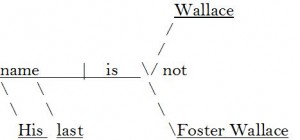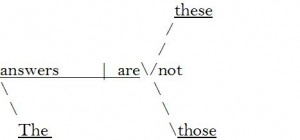
Seemed like people enjoyed talking about the finer points of grammar and usage a month or so back, so I thought I’d provide a little morsel from a nonfiction workshop I took in college taught by someone who, among other accomplishments, was the most obsessively precise user of English I have ever and will ever encounter. I have, or, well, had, David Foster Wallace to thank for my own peevishness about mistakes in what he called S.W.E., or Standard Written English. So what follows is the complete text of a worksheet from his class. Whoever can come up with the most correct corrections will win something (currently taking prize suggestions/donations). I’ll post the answers once it seems as if nobody is trying anymore. Don’t worry if someone else posts their answers first; they may not be right! Not as easy as it may first look. All sentences have one crucial error in punctuation, usage, or grammar. Okay go! ANSWERS HERE when you’re ready. And HERE is an explanation of why he took the trouble to teach us these conventions.
183D
25 February 2004
IF NO ONE HAS YET TAUGHT YOU HOW TO AVOID OR REPAIR CLAUSES LIKE THE FOLLOWING, YOU SHOULD, IN MY OPINION, THINK SERIOUSLY ABOUT SUING SOMEBODY, PERHAPS AS CO-PLAINTIFF WITH WHOEVER’S PAID YOUR TUITION
1. He and I hardly see one another.
2. I’d cringe at the naked vulnerability of his sentences left wandering around without periods and the ambiguity of his uncrossed “t”s.
3. My brother called to find out if I was over the flu yet.
4. I only spent six weeks in Napa.
5. In my own mind, I can understand why its implications may be somewhat threatening.
6. From whence had his new faith come?
7. Please spare me your arguments of why all religions are unfounded and contrived.
8. She didn’t seem to ever stop talking.
9. As the relationship progressed, I found her facial tic more and more aggravating.
10. The Book of Mormon gives an account of Christ’s ministry to the Nephites, which allegedly took place soon after Christ’s resurrection.

 From now till December 15,
From now till December 15, 

 Cronyism, the practice of promoting some people and excluding others purely on the basis on personal relationships, is bad and to be avoided. The word brings to mind corrupt politicians who award high-ranking posts or lucrative contracts to their old pals when they have no business or training to do the work.
Cronyism, the practice of promoting some people and excluding others purely on the basis on personal relationships, is bad and to be avoided. The word brings to mind corrupt politicians who award high-ranking posts or lucrative contracts to their old pals when they have no business or training to do the work. From “Blind and Dumb Criticism” in Mythologies, translated by Annette Lavers:
From “Blind and Dumb Criticism” in Mythologies, translated by Annette Lavers: